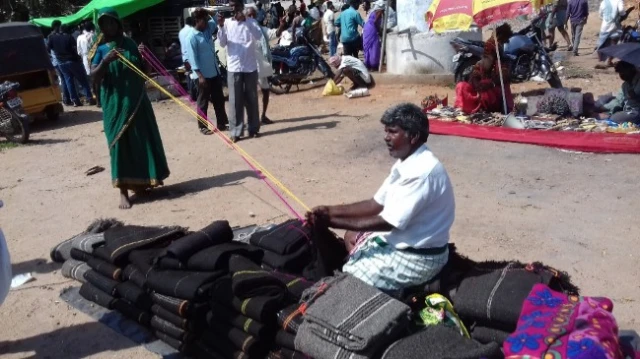Telangana’s Gongadi Shawls Refashioned into Shoes
Context:
The robust, all-weather shawl known as a gongadi in Telangana is created for generations by the Kuruma and Kuruba, pastoral communities dispersed across the Deccan plateau, using the coarse wool of the hardy Deccani sheep. Now, three graduates of the National Institute of Design, Ahmedabad, have transformed this tough material into all-weather shoes for farmers.
Points to Ponder:
- The Deccan plateau’s Kuruma and Kuruba pastoral populations have long employed the Deccani sheep, famed for its coarse wool, to make the tough, all-weather shawls known in Telugu as gongadis.
- Santosh Kocherlakota, Nakul Lathkar, and Vidyadher Bhandare, three National Institute of Design, Ahmedabad grads, have transformed the tough Deccani wool into all-weather boots for farmers.
- Santosh Kocherlakota changed his focus after realising the necessity for workable solutions. Initially, he had wanted to design for premium automobile manufacturers like Ferrari and Lamborghini.
- The crew lived in rural Maharashtra for 1.5 years, engaging with farmers and learning about their struggles.
- Santosh Kocherlakota teamed up with Nakul Lathkar and Vidyadher Bhandare to address the footwear issue encountered by farmers. Nakul Lathkar had experience developing electric cars, and Vidyadher Bhandare had worked on designing seats for Indian Railways.
- Before settling on Deccani wool as the best material for the shoes, they tested with a variety of materials, including jute, banana fibre, cotton, screwpine fibre, and water hyacinth fibre, making 40 prototypes.
- The team was given incubation financing from the Indian Institute of Technology, Madras in the amount of 10 lakh, which allowed them to intensify their emphasis on the project and increase their production efforts.
- They have created waterproof, all-weather shoes utilising Deccani wool, which offer protection and comfort for farmers working in a variety of settings.
- They first offered a small batch of 30 shoes, which immediately sold out in Kolhapur village within five days, demonstrating a good response to their creative footwear solution.
- The team has used cross-subsidization to keep the shoes affordable for farmers. Farmers can get the undyed black variant for around 900 while coloured models are sold for 2,500 in urban areas.
- The group is already producing 10,000 pairs of shoes in Agra, demonstrating their dedication to meeting the bigger scale footwear requirements of farmers.
- The tale demonstrates how the team’s design abilities changed from wanting to work on luxury automobiles to addressing issues faced by farmers, demonstrating the power of design thinking in developing useful and significant solutions.





